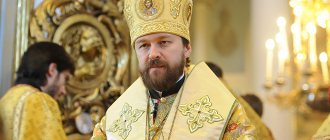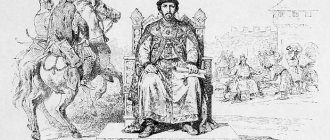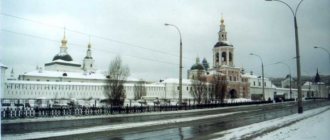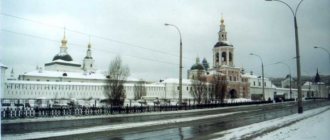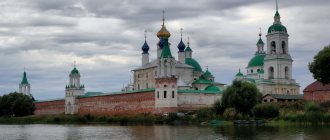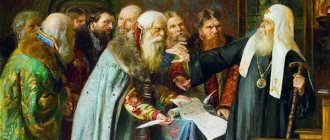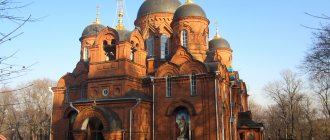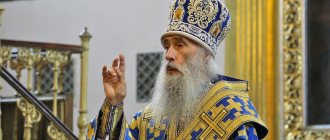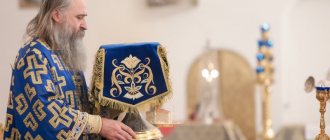Metropolitan Hilarion of Kyiv
Saint Hilarion. author unknown
Metropolitan Hilarion (nickname Rusin) - Metropolitan of Kiev and All Russia from the time of Yaroslav the Wise, saint, ancient Russian writer, thinker, church and political figure.
The Russian Church was at that time a metropolitanate, part of the Patriarchate of Constantinople. The first metropolitans in Rus' were the Greeks, their installation took place in Constantinople.
Grand Duke Yaroslav the Wise, having gathered bishops, for the first time installed “Rusyns” as metropolitans, independently of Constantinople. Under 1051, the Tale of Bygone Years reports the election of Hilarion as an all-Russian metropolitan (he was the first Metropolitan of Kiev from the Russian clergy); before his installation, Hilarion was a priest of the Church of the Holy Apostles in the princely suburban residence of Berestovo.
Hilarion was “a good man, a book and a faster,” already known as the author of the “Sermon on Law and Grace” - a remarkable monument of ancient Russian solemn eloquence, containing thoughts about the right of Rus' to equality among Christian peoples and its place in world history.
“This,” according to D. S. Likhachev, “is a most perfect work both in the depth of its content and in the brilliant form in which it is clothed: consistency, logic, ease of transitions from topic to topic, rhythmic organization of speech, variety of images, artistic laconicism make Hilarion’s “Lay” one of the best works of world oratory.”
It was written between 1037 and 1050. Hilarion became the actual founder of the Kiev-Pechersk Monastery. He participated together with Yaroslav the Wise in the creation of the first Russian. libraries at the St. Sophia Cathedral; was involved in the formation of the ancient Russian legal system; supported Yaroslav the Wise in the struggle for independence from Byzantium.
He also wrote “Prayer”, “Confession of Faith” and “A Word for the Renewal of the Tithe Church”. Hilarion traces the universal course of history, the fate of Christianized Rus' and gives an explanation of the causes and driving forces of epoch-making events.
Hilarion is convinced that world history is taking place according to a plan determined by God, and its movement itself is embodied in the introduction of more and more new peoples to “grace” (Christianity). The Slavs, like other peoples, are destined to go through two stages, two states.
An extranatural source of grace inevitably leads the ancient Slavs from an imperfect past (paganism) to a perfect future (conversion to Christianity).
The work contains, perhaps for the first time in Christian literature, the idea of equality of all peoples. The only exceptions are the boring ones, who have exalted their superiority and are frozen in a slavish state of legality.
Russian monk chronicler. Illustration from the book. History of Russian Goverment
Based on the idea of the equality of all peoples, the right of the young Slavic people “to be new wineskins for old wine” is affirmed, Byzantium’s claims to monopolistic possession of “grace” and the arrogance of the Greeks in front of the “young peoples” as barbarians deprived of their own history are condemned.
Hilarion expresses the idea of the great destiny of Rus', its ability to create great achievements. On the one hand, Russian history is part of the world, and on the other, a past rich and glorious in events, in which even the great deeds of pagan princes are glorified.
Hilarion's main insight was his statement about the spiritual nature of the force that united the disparate Slavic tribes into a single people. The Metropolitan speaks of the Russian people as an entity united under the authority of God around a religious Christian principle, the ideal of which is embodied in the Orthodox Church.
The “Word” itself is perhaps the only monument of the 11th century in which the phrase “Russian people” is used, and not the concept “Russian land”, which was usual for that time.
Hilarion had long been known to the people of Kiev as the presbyter of the princely Church of the Holy Apostles in the town of Berestovo near Kiev. There, perhaps, he wrote his famous “Sermon on Law and Grace,” which became one of the first attempts at a Christian understanding of Russian history.
Nativity. Novgorod school. First half of the 15th century
The Metropolitan speaks of a God-determined role specifically for the Russian people, who previously “stumbled” “on the paths of destruction,” and now “in all their homes” exclaims: “Christ is risen from the dead!” It is these who glorify Christ who pray to God to “work again and again and direct us on the path commanded by Him,” that is, to reveal why new converts are given the opportunity to feel and realize their community, why they are determined to be one people, what are the quality such is their duty.
Hilarion did not occupy the metropolitan throne for long, since the independent installation of a Russian metropolitan was an obvious violation of the usual rules. Whether this or something else played a role, we do not know, but after the death of Yaroslav the Wise, Hilarion left the see, which since 1055 has been occupied by the new metropolitan, the Greek Efim.
Hilarion, having settled in the Kiev-Pechersk Monastery, accepted the schema. His soul had long been burdened by the world and strived for contemplation and silence. While still a presbyter in Berestov, he, according to the testimony of “The Tale of Bygone Years,” “found a small two-fathom pecherka” on the banks of the Dnieper in a place where “the white... forest is great,” and in it, “coming from Berestov, chanting the hour and praying to that God in secret."
At the monastery, he copied books in the cell of St. Theodosius, remaining in obedience to him and asking for advice when difficulties and temptations arose. Memory of St. Hilarion, the schema monk of Pechersk, the Russian Orthodox Church celebrates on October 21.
Russian ancient manuscript. Illustration from the book. History of the Russian State p.8
The decree of Metropolitan Hilarion (miniature of the Radzivilov Chronicle)
Likhachev D.S. Russian chronicles and their cultural and historical significance. M.; L., 1947, p. 70 N. N. Rozov. Dictionary of scribes and bookishness of Ancient Rus'. Shikman A.P. Figures of Russian history. Biographical reference book. Moscow, 1997 V.V. Milkov. New philosophical encyclopedia. In four volumes. / Institute of Philosophy RAS. Scientific ed. advice: V.S. Stepin, A.A. Guseinov, G.Yu. Semigin. M., Mysl, 2010, vol. II, E – M, p. 93-94. V.V. Milkov. Russian philosophy. Encyclopedia. Ed. second, modified and expanded. Under the general editorship of M.A. Olive. Comp. P.P. Apryshko, A.P. Polyakov. – M., 2014, p. 220-222.
Portraits of figures in similar areas of activity:
Job, Patriarch of Moscow and All Rus'... David Svyatoslavich, Prince of Chernigov... Gleb Vladimirovich, Prince of Murom... Fyodor I Ioannovich, Tsar and Grand Duke of All Rus'... Hermogenes, Patriarch of Moscow and All Russia... Joachim, Patriarch of Moscow and All Russia... Yaroslav the Wise, Prince of Novgorod and Grand Duke... Igor Olgovich, Prince of Chernigov... Boris and Gleb Boris Vladimirovich, Prince of Rostov... Vladimir Yaroslavich, Prince of Novgorod... Oleg Ivanovich, Grand Duke of Ryazan... Joseph Volotsky
Writer and philosopher
Nevertheless, the personality of Hilarion, Metropolitan of Kyiv, undoubtedly belongs to the most significant in Russian history. After all, he made a significant contribution to the formation of Russian culture, creating the first Russian literary and philosophical work - “The Tale of Law and Grace.”
The Discourse on Law and Grace was written between 1037 and 1050. It was very popular in Rus'; it is not without reason that more than fifty of its copies of the 15th-16th centuries are known today in various editions. In addition, Metropolitan Hilarion owns two texts - “Prayer” and “Confession of Faith”, which are usually published together with the “Word”.
Logical analysis allows us to divide the “Word of Law and Grace” into three component parts. The first is a kind of philosophical and historical introduction. It is based on a discussion about the relationship between the Old and New Testaments - “Law and Grace”. The meaning of such reasoning is varied. On the one hand, this is a continuation of a purely theological dispute between the Western, Roman Church and the Eastern, Orthodox Church. The fact is that Western Christianity revered the Old Testament as a collection of various kinds of legal norms, as a justification for the pragmatic aspirations characteristic of the Western world. In the east, the Old Testament was given much less importance.
Hilarion in his “Word” stands closer to the Eastern Church. He says: “First the Law was given, and then Grace; first the shadow, and then the truth.”
Thus, Hilarion emphasizes that following the norms of the Old Testament alone does not lead people to the salvation of the soul, just as the knowledge of the Law (“shadow”) of the ancient Jews did not save them.
Moreover, preference for the Old Testament can lead to Judaism. Only the New Testament (“truth”), given to humanity by Jesus Christ, is Grace, for Jesus, with his death, atoned for all human sins, and with his posthumous resurrection opened the path to salvation for all peoples.
To prove his thought, Hilarion writes a lengthy discussion on the biblical parable of Sarah and Hagar. This reasoning is the first example of a symbolic-allegorical interpretation of biblical subjects in Russian literature. Subsequently, the symbolic interpretation of the Bible will become the main method in the work of ancient Russian scribes.
The essence of the parable is this. Sarah, the wife of the forefather Abraham, was barren for a long time. And Abraham, on the advice of his wife, begat a son, Ishmael, from the slave girl Hagar. But the Lord had mercy on Sarah, and in her old age she was also able to give birth to a son, Jacob.
The meaning of this parable, according to Hilarion, is very deep. Hagar is an image of the Old Testament, the Law. Her son is born earlier, but, born of a slave, continues to remain a slave himself. Sarah is a symbol of the New Testament, Grace, which gives birth to a free Jacob. Likewise, the Old Testament cannot be true, although it came before the New Testament. Therefore, it is not the “birthright” that is decisive, but the fact that the Lord sent the truth to people in the Testaments of Jesus Christ. “The law existed before and rose somewhat, but it passed away,” says Hilarion. - And the Christian faith, which appeared last, became greater than the first and spread into many languages. And the Grace of Christ, having declared the whole earth, covered it like the waters of the sea.”
In Hilarion's discussion of Sarah and Hagar, two important ideas can be traced. Firstly, Christ's Grace is so significant that it saves all people who have received Holy Baptism, regardless of when the baptism itself occurred. Secondly, the mere fact of baptism is enough for people who accepted it to be worthy of salvation. “Christian salvation is gracious and abundant, reaching to all the ends of the earth...” writes Hilarion. “Christians, by hasting truth and Grace, are not justified, but are saved.”
Finding the way
In the second part of the Lay, Hilarion develops the ideas of salvation by Grace alone, already applied to Rus'. The Baptism of Rus', performed by Grand Duke Vladimir, showed that Grace had spread to Russian borders. Consequently, the Lord did not despise Rus', but saved it, leading it to the knowledge of the truth. “And we are no longer called idolaters,” writes Hilarion, “but Christians, not still living without hope, but hoping for eternal life.”
Having accepted Rus' under his protection, the Lord granted it greatness. And now this is not an “unknown” and “seedy” land, but the Russian land, “which is known in all the four corners of the world that have heard about it.” Moreover, Christian Rus' can hope for a great and wonderful future, for it is predetermined by God's providence.
The third part of the “Word” is devoted to the glorification of the great princes of Kyiv. First of all, we are talking about Prince Vladimir (baptized Vasily), whom “the Almighty visited with His visit.” In addition, Hilarion glorifies Prince Yaroslav the Wise (baptized George), whose contemporary and comrade-in-arms the Metropolitan himself was. But it is interesting that Hilarion also glorifies the pagans Igor and Svyatoslav, who laid the foundation for the future power of the Russian state. Moreover, in his work Hilarion refers to the Russian princes with the title “Kagan”. But this title in those days was equivalent to the title of emperor. And Hilarion compares Prince Vladimir himself with the Byzantine Emperor Constantine.
As you can see, the theological reasoning of Metropolitan Hilarion is the basis for serious historical and political generalizations and conclusions. Evidence in favor of Grace gives Metropolitan Hilarion the opportunity to show the place and role of Rus' in world history, to demonstrate the greatness of his homeland, for Rus' was sanctified by Grace, and not by Law.
In fact, “The Lay” is a song of praise to Rus' and its princes. And the chanting of the dignity and glory of the Russian land and the descendants of Igor the Old who reigned there is directed directly against the political claims of Byzantium.
